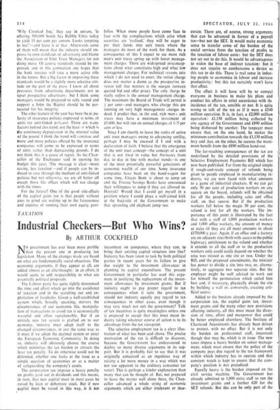`Wily Crooked Joe,' they say in unison, is offering 500,000
South Sea Bubble Units today to yield 15 per cent per annum. Looks tempting to me!'—and leave it at that. Afterwards some of them will moan that the industry should im- prove its own standards of advertising and blame the Association of Unit Trust Managers for not doing more. Of course standards should be im- proved, and in this connection one hopes that the bank trustees will take a more active role in the future. But a big factor in improving these standards would be a slightly more selective atti- tude on the part of the press. I know all about pressures from advertising departments not to upset prospective advertisers: but 1 think some managers would be prepared to rally round and support a John the Baptist should he be per- secuted for his integrity.
The other feature of the year has been the popu- larity of insurance policies expressed in terms of units (or unit-linked polities). There are many factors behind this trend, not the least of which is the continuing depreciation in the internal value of the pound. I think the trend will continoe and more and more policies offered by the insurance companies will come to be expressed in terms of units rather than depreciating pounds. I do not think this is a cause of regret. As the Chan- cellor of the Exchequer said in opening his budget this year, The message is clear—more saving, less taxation—and if people can be in- duced to save through the medium of unit-linked policies but not otherwise, we are all better off except those life offices which will not change with the times.
For the future? One of the good side-effects of the capital gains tax is that people without axes to grind are waking up to the fatuousness and expense of running their own equity port-
folios. When more people have come face to face with the complications which arise when securities are 'realised,' they will be eager to put their funds into unit trusts where the managers do most of the work for them, As, a consequence of this I expect to see more rich men's unit trusts spring up with lower manage- ment charges. There are widespread misconcep- tions about what constitutes high and what low' management charges. For technical reasons into which I do not need to enter, the initial charge does not matter a damn to the prospective in- vestor (all that matters is the margin Between quoted bid and offer price). The only charge be really sutlers is the annual management charge. The maximum the Board of Trade will permit is 4 per cent—and managers who charge this are running on very high management charges in- deed. 1 predict that, in the end, rich men's unit trusts may have a minimum investment of £5.000, but will run on annual charges of 1/5 per cent or less.
Since I am shortly to leave the ranks of active unit trust managers owing to advancing senility, perhaps 1 may be excused if I end with a declaration of faith. 1 believe that the emergence of the unit trust concept—the concept of a unit that is not fixed in value but fluctuates from day to day in line with market trends—is one of the most potentially powerful generators of economic wealth of our time. Some insurance companies have been on the band-wagon for some time, Lloyds Bank is about to jump on and the Trustee Savings Banks have announced their willingness to jump if they are allowed to. Hoorah! Would that I could get myself in a position where I could place a well-aimed kick at the backside of the Government to make that sprawling old elephant jump too.






































 Previous page
Previous page